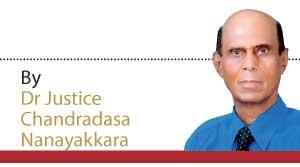30 Aug 2023 - {{hitsCtrl.values.hits}}

They are guides to help follow the path to enlightenment., and accumulate good kamma. Morality in Buddhism is essentially practical in that it is only a means leading to the final goal of ultimate happiness. The five precepts as a disciplinary code enable laymen to live a virtuous and noble life without renouncing worldly life.
The decline in moral and ethical values is a global phenomenon. The erosion of moral values has become a very disturbing feature in our society. We live in a hedonistic materialistic world in which the acquisition of material possessions and otherworldly things takes pride of place over pursuing ethical and spiritual values. Society today is wreaked by violence and other heinous crimes.
in which the acquisition of material possessions and otherworldly things takes pride of place over pursuing ethical and spiritual values. Society today is wreaked by violence and other heinous crimes.
Crimes such as murder, sexual harassment, drug addiction, theft, and corruption have become the order of the day. Great moral and ethical values that existed in traditional Buddhist societies seem to have been replaced by selfish motives and egoistic drives of human beings. People’s insatiable avarice and greed have eroded time-honoured ethics and moral values. They have little concern for spiritual and ethical values.
The world has become so competitive that people dare to lie, cheat, and bribe to get what they want. Even people in leadership positions lack integrity and lie and distort the truth to achieve their objectives. Moreover, indiscipline on the road is worsening by the day. As a result. driving on our roads has become a stressful experience.
It goes without saying, that the decline of moral and ethical values is bound to impact negatively modern society and impede its progress destroying everything in a nation. Today, a lack of moral and ethical values can be seen in every sphere of life in our society. It is an objective reality that no one can deny. Most of the problems that society experiences today can be attributed to the non-observance of good moral and ethical principles. It is by the standards of morality that people maintain that the fabric of any society can be held together.
Moral values are standards by which we distinguish between right and wrong, good and evil. Many people use the words morality and ethics interchangeably. Like morality, ethics is basically concerned with what is right or wrong in human conduct. Ethics and morality play a crucial role in guiding people to live a harmonious life and how to interact with each other. Ethical and moral principles guide people’s behaviour, decisions, and actions.
Throughout human history, moral and ethical values have always been important for interfaith harmony, peace, and progress. Both ethics and morality help you to abandon the distorted projections that our thoughts and emotions create and also to promote collaboration and community existence. But ethics should not be identified only with religion, as ethics can apply even to an atheist. Religion is the basis for morality and it is the religion that can set high standards and provide intense motivation for ethical behavior. Most of the ethical and moral values that people observe today are those preached by the founders of dominant religions in the world. In essence, morality is a practice that maintains your status as a decent human being.
Buddhism upholds lofty and demanding moral and ethical values in many of its scriptures and codes of precepts. Buddha declared in many of his discourses that true happiness could only be realized by leading a life of moral rectitude or virtue.
The five precepts in Buddhism, which are known as Pancasila in Pali and Sanskrit constitute the minimal standard of morality that Buddhists are expected to observe in their day-to-day lives. They represent Buddhism’s core values, which can be followed not only by Buddhists but also by people belonging to other religious persuasions.
The precepts are normative They are analogous to the spirit of the Ten Commandments of Christianity and the codes of conduct of many other religions. Unlike the Ten Commandments precepts are accepted voluntarily by the person himself, as undertakings rather than commandments enforced by divine authority. Precepts are forms of restraint on our conduct formulated in negative terms.
They are guides to help follow the path to enlightenment., and accumulate good kamma. Morality in Buddhism is essentially practical in that it is only a means leading to the final goal of ultimate happiness. The five precepts as a disciplinary code enable laymen to live a virtuous and noble life without renouncing worldly life.
In Buddhism, the quality of any act depends on the intention of the person who commits it. If a person performs an action out of greed, hatred, and delusion his action is considered to be unwholesome. Therefore, in the practice of the five precepts underlying intention with which one practices it would be important. Consciousness is considered the forerunner of our actions.
Dhammapada states “Mind is the forerunner of all things, mind is their leader; they are made by the mind. When someone speaks or acts with impure thoughts, suffering follows, like the wheel follows the hoof of the ox.”
The morality of Buddhism that Buddha propounded thousands of years ago offers timeless wisdom that resonates just as much today. By following the basic principles of morality, we can prevent destructive unwholesome, and negative emotions from taking hold and maintain inner peace regardless of the problems we face today.
The objective of Buddhist morality (sila) is to eliminate crude passions that are expressed through thought, word, and deed. It is by these three means a person’s morality is measured. Therefore, as Buddhists, we are expected to examine regularly whether or not what we think, do, and say causes harm to ourselves and others. This is known as training in virtue (sila sikka).
The three factors of the noble eightfold path form the Buddhist code of conduct. (Sila). They are right speech, right action, and right livelihood. Observance of the five precepts is considered the stepping stone for the cultivation of higher virtues and mental development.
The Five Precepts also embody the spirit of fundamental human rights that are of universal nature. The extent to which people observe the Five Precepts differs from person to person, from society to society, and from country to country. According to Buddhism, living a life in violation of the precepts is believed to lead to rebirth in an unhappy destination. The five precepts form part of eight precepts that Buddhists observe particularly on Poya Days.
Morality ( Sila ) as the most important step on the spiritual path contributes to harmonious and peaceful co-existence among diverse communities. In a society where morality prevails members are conscious of their respective roles and duties essential for mutual trust and security, leading to the prosperity and progress of society. Non-adherence to principles of morality can often bring about unrest and turmoil in a country.
Morality (Sila) is closely related to the practice of mindfulness (sati) High morality requires a high degree of mindfulness to continuously monitor the mind, speech, and actions.
Therefore, the whole teaching of Buddhist morality can be summed up in one stanza. “ Sabbapapassa akaranam, kusalassa upasampada, sacittapriyodapaanam, etam Buddhana sasanam.” Abandoning what is evil, cultivating what is good, purifying one’s mind, that is the teaching of the Buddhas.”.
Core principles of Buddhism focus on how to live a virtuous life by practising self-control and letting off destructive emotions like anger and other three unwholesome roots. This enables adherents to gain an objective perspective and tranquillity in the face of many problems in life.
A life grounded in morality is always free from mental restlessness, turmoil, and anxiety. Observing the Five precepts has been shown to buffer the effects of perceived stress on depression. It is believed that people with high levels of observing the five precepts in their day-to-day lives would be less likely to develop depressive symptoms (Wongpakran). Moreover, the five precepts along with the triple gem are the required conditions for the practice of Buddhism and the formal initiation to become a Buddhist. The Buddhists normally remind themselves of their commitment to keeping these precepts by observing them at least once a day.
By the first precept, we undertake to refrain from taking the life of a living being. it is based on the belief that all life is precious and sacred. Aiding and abetting someone to kill a living being is no different from killing yourself. It is a commitment to non-violence and compassion for living beings and is not limited to human beings but extends to all sentient beings. It presupposes that all life is interconnected and any harm done to a living being can have an impact on the ecosystem. It encompasses a wide range of acts such as violence, murder capital punishment, and disapproval of abortion, euthanasia, and suicide.
By the second precept, we undertake to refrain from taking what is not given. It underscores the respect for the rights of others. It signifies an individual right to possession as well as the protection of wealth rightly acquired. It encompasses acts such as deception, coercion, misappropriation, and exploiting another’s vulnerability. The precept promotes fairness integrity and respect for others’ property.
By the third precept, we undertake to refrain from sexual misconduct that causes harm and distress to others. It includes actions like adultery and sexual exploitation. Sexual misconduct stems from sensory desire. Rape, prostitution, incest, bigamy, and seduction are all violations of this precept.
By the fourth Precept, we undertake to abstain from falsehood and to speak the truth. The Precept covers such acts as tale-bearing, harsh and abusive speech, idle chatter, vain talk, and gossip which brings about discord and disharmony between families, friends even nations. Observance of this precept is conducive to concord harmony.
By the fifth precept, we undertake not to consume alcoholic drinks and other stimuli that cause loss of conscience. Substances like marijuana, opium, and morphine heroin come under this precept. People tend to think taking a drink once in a way is not harmful, but the real problem is what they do when they are under the influence of alcohol. When a person is under the influence of liquor he is no longer in full control of his mental faculties. Because of that, he would do things that he would never otherwise do. The breach of this precept leads to the degradation of the individual, disruption of the family life, and the degeneration of society.
09 Jan 2025 2 hours ago
09 Jan 2025 3 hours ago
09 Jan 2025 6 hours ago
09 Jan 2025 6 hours ago
09 Jan 2025 7 hours ago